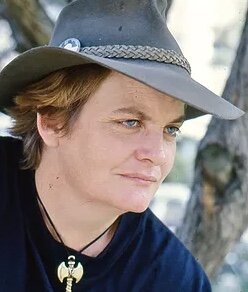 Image 1 of 2
Image 1 of 2

 Image 2 of 2
Image 2 of 2



Holding Yawulyu: White Culture and Black Women's Law
Mapping inter-cultural relationships as they are played out in a remote Aboriginal settlement in Western Australia's Great Sandy Desert, this book challenges White Australians to reconsider their relationship with Indigenous peoples. Unpacking White cultural practices, it explores the extraordinary difficulties which Indigenous women face when they attempt to maintain and pass their cultural knowledge, customs and skills on to their children and youth. From 1999 to 2001, Zohl dé Ishtar lived and worked intimately with a group of thirteen women elders to establish a vibrant intergenerational cultural knowledge transmission program: the Kapululangu Women's Law and Culture Centre. Through this profound experience Zohl identified 'Living Culture', the cultural energy which is created when individuals live their culture to its fullest expression enabling them to transform their worlds even when to do so seems impossible. Her profound radical feminist analysis of the socio-cultural context surrounding this Indigenous women's initiative challenges White attitudes and behaviours and offers a deeper comprehension to those who aspire to be involved in collaborative projects with Indigenous peoples. A lyrical and passionate book.
2005 | ISBN 9781742199795 | Paperback | 220 x 140 mm | 425 pp
eBook Available
For more paperback copies, please visit IPG Book in the US or Gazelle Book Services in the UK
Mapping inter-cultural relationships as they are played out in a remote Aboriginal settlement in Western Australia's Great Sandy Desert, this book challenges White Australians to reconsider their relationship with Indigenous peoples. Unpacking White cultural practices, it explores the extraordinary difficulties which Indigenous women face when they attempt to maintain and pass their cultural knowledge, customs and skills on to their children and youth. From 1999 to 2001, Zohl dé Ishtar lived and worked intimately with a group of thirteen women elders to establish a vibrant intergenerational cultural knowledge transmission program: the Kapululangu Women's Law and Culture Centre. Through this profound experience Zohl identified 'Living Culture', the cultural energy which is created when individuals live their culture to its fullest expression enabling them to transform their worlds even when to do so seems impossible. Her profound radical feminist analysis of the socio-cultural context surrounding this Indigenous women's initiative challenges White attitudes and behaviours and offers a deeper comprehension to those who aspire to be involved in collaborative projects with Indigenous peoples. A lyrical and passionate book.
2005 | ISBN 9781742199795 | Paperback | 220 x 140 mm | 425 pp
eBook Available
For more paperback copies, please visit IPG Book in the US or Gazelle Book Services in the UK

Reviews
This is one of the strongest, most consistent, insightful and well documented case studies of the nature and impact of racist and sexist and class dynamics that I have read. The author's confident interdisciplinarity is also a rare and essential component of this impressive study of the complex integrated historical and current spiritual, political, cultural, social and personal elements of White Culture's interaction with and impact on Black Women's Law.
—Angela Miles, Ontario Institute for the Sociology of Education, Toronto
We live in a time no less dangerous than those of previous generations. It is our personal responsibility to learn how internalised racism poisons aboriginal lifeworlds as surely as kero poisoned waterholes and strychnine poisoned flour. Only when the truths contained in these pages are fully felt, and our part in these realities comprehended, will we begin to understand how we can shift the stranglehold of the dominant paradigm. We each hold the potential to transform apathy into evolutionary action. Zohl’s story dares to dream visions into reality.
—Ochre Doyle, Aboriginal artist and adult educationalist
'…it stands as a valuable historical reference and as a memoir of a courageous woman. Zohl dé Ishtar was nominated for the Nobel Peace Prize as a member of a body of 1000 women who have committed their lives to peace. This book reflects that commitment, and offers valuable insight into the perseverance-through-struggle of the amazing Kapululangu women elders of Wirrimanu.'
—Robyn Hillman-Harrigan, Traffic
'… a moving, important study, not least of the bureaucratic and political obstacles to developing genuinely new relationships between White and Indigenous cultures.'
—David Carter, Westerly
'As dé Ishtar notes, the paucity of the written word can barely encompass the richness of the lived experience: 'dirt, rubbish, dogs and violence are only the tip of the iceberg in the challenges facing White attempts to dismantle our cultural biases and prejudices'. Nevertheless, her self-reflective discussion of the difficulties as well as the tanscendental joys of dwelling in another culture offer her readers, many of whom lack the fortitude for two years in a tin shed marooned from our native tongue, some memorable insights.'
—Chilla Bulbeck, Reviews in Australian Studies
'This is one of those books that I wish everyone would read. I think it's one of the most important, moving and compelling books I have ever read.'
—Ruth Wykes, Women Out West
‘I believe this book has great relevance to all of Australia as well supporting our struggle to find ways in which we can live together.’
—Judy Atkinson, Professor of Indigenous Studies, Gnibi, College of Indigenous Australian People


